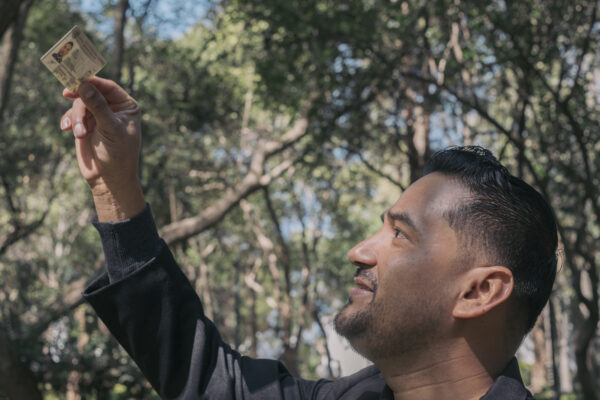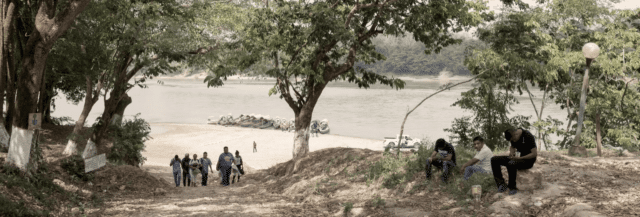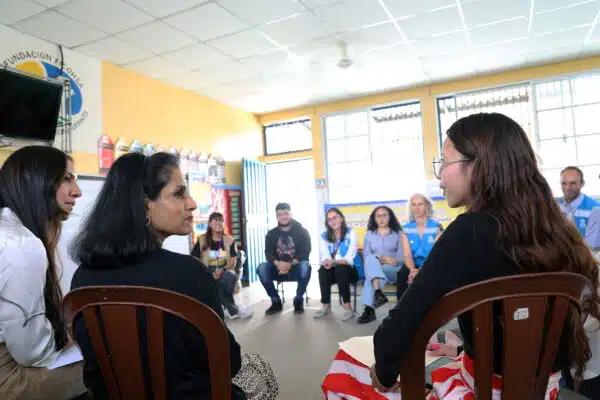
Juan Manuel Pedraza spends his days digitizing the documents of thousands of people who have applied for asylum in Mexico. © UNHCR/Pierre-Marc René
This digitization program supported by UNHCR and funded by the Government of Canada has been key to responding to the growing number of asylum applications in Mexico, which surpassed all records in 2023, when more than 140,000 people applied for international protection in the country
By Pierre-Marc René in Tapachula, Mexico
Juan Manuel Pedraza (32 years old) spends his days digitizing the documents of thousands of people who have applied for asylum in Mexico.
“Although these are just numbers and pages, each file represents the life of a person, the reason for their departure, their well-founded fear if they have one, in order to be able to apply for refuge here in Mexico,” says the young man, who is responsible for the archive of the Mexican Commission for Refugee Aid (COMAR) in Tapachula.
Juan Manuel is part of a nationwide team that has dedicated countless hours to COMAR’s digital transformation. This UNHCR-supported program, funded by the Government of Canada, has been key to responding to the growing number of asylum applications in Mexico, which surpassed all records in 2023 when more than 140,000 people applied for international protection in the country.
In Tapachula, the team has digitized more than 191,000 files and for Juan Manuel, each one represents the story of every person fleeing their countries to save their lives or find a place to live in peace.
“It is very important for us to treat these files with dignity because our maxim is to dignify the archive, to dignify the file, to dignify the person and facilitate their asylum process in this country,” he says with a visible passion for his work.
“I have been offered to go to other departments like protection or registry, but I sincerely believe that the work of the archive is very noble. It is a job where we have the ability to safeguard and to protect the life history of a person,” he adds.
Previously, the files were only stored on paper, presenting a significant challenge for the team in Tapachula led by Juan Manuel. After participating in specialized training, his team can now digitize up to 150 files a day.
While more than 60 percent of all asylum applications that COMAR receives nationally are registered in Tapachula, the Canadian-supported digitization program covers needs nationwide and has allowed for the digitization of more than 251,000 files in Tijuana, Palenque, and Mexico City.
“When we take the time to read the files, we realize that people don’t leave their country for the fun of it. People leave because they have protection needs that their countries of birth could not fulfil and for us to protect that file, protect that story, protect the evidence they bring -sometimes powerful photographs, sometimes audios, sometimes screenshots of digital conversations – is to safeguard the integrity of these individuals, especially because they deserve dignified and humane treatment,” shares Juan Manuel.
Digitalization has helped COMAR to promptly respond to requests for information, as it allows those with access to the Refugee Information System (SIRE) to view files in real-time and to provide a fast and efficient response to asylum seekers. Furthermore, it also allows the National Migration Institute to review whether people have an asylum process underway, to avoid deportations and ensure international protection, as well as to certify data or information and to be able to deliver documentation such as permanent residence. The digital archive has also facilitated processes and accelerated the response time for refugees seeking to rebuild their lives through the Local Integration Program (PIL) led by UNHCR. The information, accessible in real-time, makes it easier for people to relocate to other cities in the country where there are more employment opportunities, with the support of UNHCR, Mexican authorities, and their partners.
“I am very happy working in archive as it gives us the ability to help a little in this immense ocean that is the refugee process in Mexico. Each department and every one of my colleagues play a crucial role in advancing the tasks entrusted to us. There is a lot of room for improvement, we still have a lot to do, but at the end of the day, with what we have, we get the job done. Our work is a pinch in this great recipe so that people can enjoy a dish called “asylum”” concludes Juan Manuel.
Since 2021, UNHCR, with the financial support of the Government of Canada, has developed different projects to strengthen the capacity and streamline the processes of the asylum system in Mexico. These have contributed to the digital transformation of COMAR, the reorganization of physical files, and the implementation of a robust system to track and follow up on asylum seekers’ dossiers. Thanks in part to the digital transformation, COMAR has been able to quadruple its capacities since 2018.
Originally published by ACNUR on 1 July 2024.





